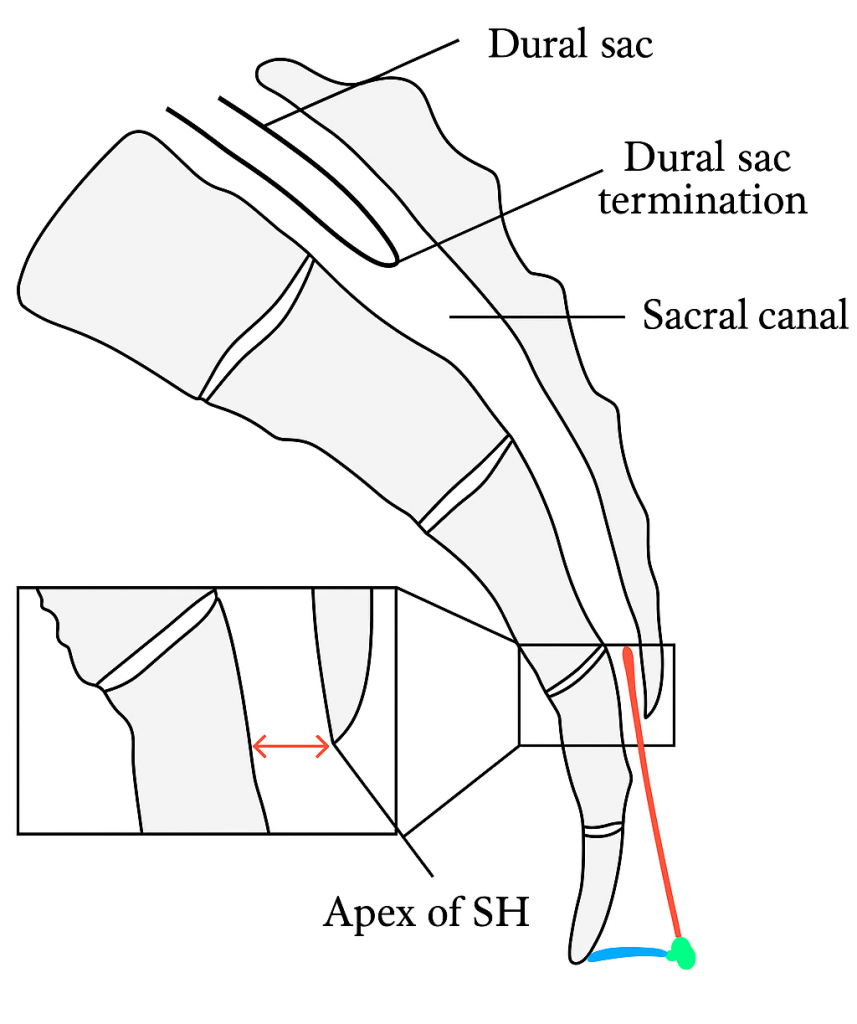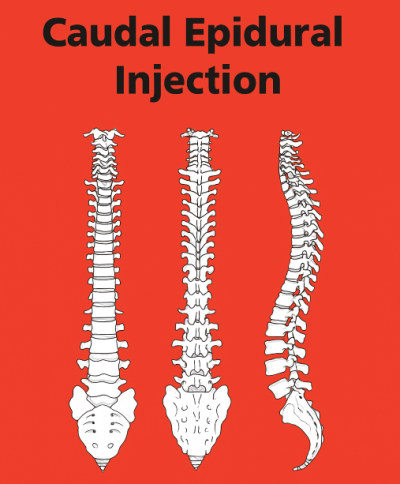A caudal epidural injection is a procedure used to treat lower back and leg pain caused by irritation or compression of the spinal nerves. This pain may be due to disc prolapse, spinal stenosis, scar tissue from previous surgery, arthritis or other spinal conditions. Symptoms often include pain radiating from the lower back into the buttocks, thighs or legs (sciatica).
The aim of a caudal epidural is to deliver anti-inflammatory medication (steroid and/or local anaesthetic) directly into the epidural space at the base of the spine. This reduces inflammation around the nerves and relieves pain. In some cases, a thin catheter is inserted into the epidural space so that medication can be delivered at the most appropriate spinal level depending on your diagnosis.
About the Procedure
The procedure is usually carried out under local anaesthetic, though intravenous sedation may also be given to make you relaxed and drowsy. You will lie on your stomach on the operating table. The skin over your lower back and sacral area is cleaned with antiseptic solution. Using X-ray (fluoroscopy) guidance, the doctor introduces a fine needle into the caudal epidural space through an opening at the base of the spine (the sacral hiatus).
If needed, a catheter may then be threaded up into the epidural space to deliver medication closer to the affected nerve roots at the correct spinal level. A mixture of local anaesthetic and steroid is then injected. The procedure usually takes 15–30 minutes depending on whether a catheter is used.

This is a day case procedure, so you will usually go home the same day. You may notice temporary numbness or weakness in the legs after the injection, which wears off as the anaesthetic wears off.
Pre-operative assessment
a member of the pre-operative team will contact you to discuss important details and assess your fitness for surgery. They will ask about your medical history, any current medications, and allergies, as well as answer any questions you may have about the procedure. This step ensures that the surgical team has all the necessary information to plan your care safely. In some cases, you may also be invited to attend a pre-assessment clinic, where additional checks can be carried out to confirm that you are ready for the procedure.
Fasting
It is essential to follow the fasting instructions before your procedure. You must stop eating solid food 6 hours before the operation. Clear fluids such as water, black tea, or black coffee (without milk) can be consumed up to 2 hours before your procedure. However, nothing should be eaten or drunk in the final 2 hours before the procedure. These guidelines are very important to reduce the risk of complications related to sedation or anaesthesia.
Risks and Complications
Caudal epidural injections are generally safe. However, like all procedures, there are some potential risks, which include:
• Temporary numbness, tingling or weakness in the legs
• Local soreness or bruising at the injection site
• Headache due to leakage of spinal fluid (rare)
• Infection or bleeding at the needle site (very rare)
• Allergic reaction to medications or contrast dye (rare)
• Rise in blood sugar for a few days (in people with diabetes)
• Side effects of steroids such as flushing, changes to menstrual cycle, or sleep disturbance (usually temporary)
• Risks of sedation: drowsiness, nausea, drop in blood pressure, or slowed breathing (monitored closely by your anaesthetist)
You must inform your consultant if you are taking blood-thinning medicines (such as warfarin, rivaroxaban, clopidogrel or aspirin), as these may need to be stopped before the procedure.
What to expect on the day
You may be admitted early so that your anaesthetist and consultant can see you before theatre. You will be taken to the operating room, where the injection will be performed. Afterward, you will be monitored in the recovery ward while your pulse and blood pressure are checked. If sedation was given, oxygen may be supplied while you wake up.
Most patients are discharged the same day, once they are able to walk safely.
Going Home
You will normally be able to go home within 2-3 hours of the injection. If you had sedation, you must not drive for 48 hours and a responsible adult should stay with you overnight.
It is important to continue your usual pain medications until you feel the benefit of the injection. Do not stop strong painkillers (such as morphine, gabapentin, pregabalin or amitriptyline) suddenly – your GP or consultant will advise you on tapering them if necessary.
Driving
Do not drive until you feel confident that you can perform an emergency stop safely. If you have leg weakness, numbness, or significant pain, you should wait until these symptoms improve.
Work
If you had sedation, you should take at least the following day off work. Some patients may need longer depending on their symptoms and recovery. The hospital can provide a medical certificate if required.
Follow up
Your consultant will arrange a follow-up appointment, this is usually 4-6 weeks after the injections and organised by Mr. Al-Mahfoudh’s PA. At that clinic, the efficacy and results/ future management plan are discussed. The benefit from caudal epidural injections varies – some patients experience weeks or months of relief, while others benefit for longer. If your pain returns, the procedure may be repeated after several months, or your consultant may discuss alternative treatments.
—————
If you have any questions about this leaflet or your planned caudal epidural procedure, please discuss them with Mr Al-Mahfoudh in clinic or his PA. You may also contact the preoperative team at the hospital where your procedure is scheduled.
For further information / contact us
Mr Al-Mahfoudh’s PA
07501 703075
secretary@spineandbrain.co.uk
Pre-operative team at Spire Gatwick
01293 306 122
gphpre-assessment@spirehealthcare.com
Pre-operative team at Spire Montefiore
01273 829 350
montefioreadmissionspsc@spirehealthcare.com

